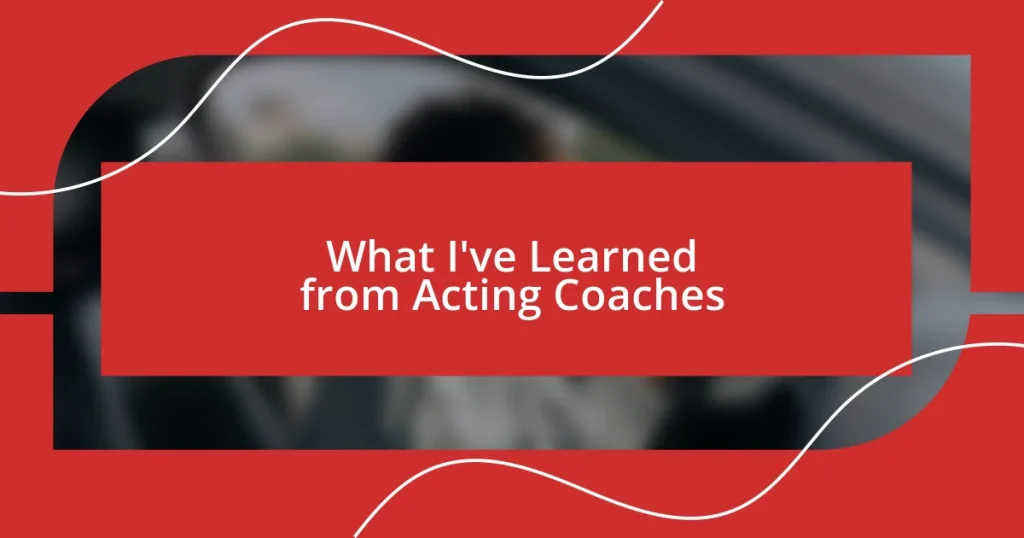Key takeaways:
- Vulnerability and emotional authenticity are crucial for connecting with both the character and the audience during performances.
- Collaboration and understanding character motivations enhance scene work and facilitate genuine portrayals.
- Balancing emotion with technique leads to powerful performances; technique serves as a tool to channel emotional depth effectively.
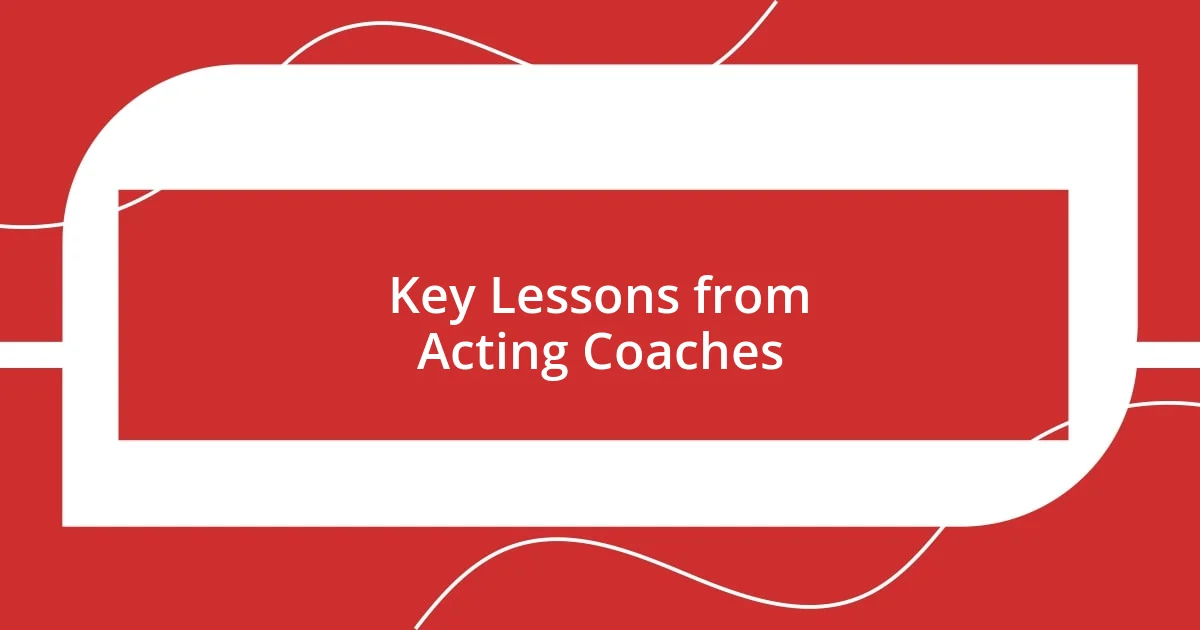
Key Lessons from Acting Coaches
One crucial lesson I’ve had from acting coaches is the importance of vulnerability. I remember standing on stage as my coach urged me to let go of my inhibitions. The moment I allowed myself to feel the character’s pain, it transformed my performance; can you imagine the connection that created with the audience?
Another key insight I’ve learned is that collaboration is essential in acting. Working closely with fellow actors has shown me how shared energy brings a scene to life. Have you ever noticed how one actor’s enthusiasm can ignite another’s? I’ve felt that spark firsthand, and it’s truly powerful.
Finally, the concept of persistence has been a cornerstone of my training. I recall a time when a simple scene felt impossible; my coach emphasized that failing is part of the process. It made me wonder—what if every setback is really a setup for a breakthrough? Embracing that mindset has been a game changer for me.
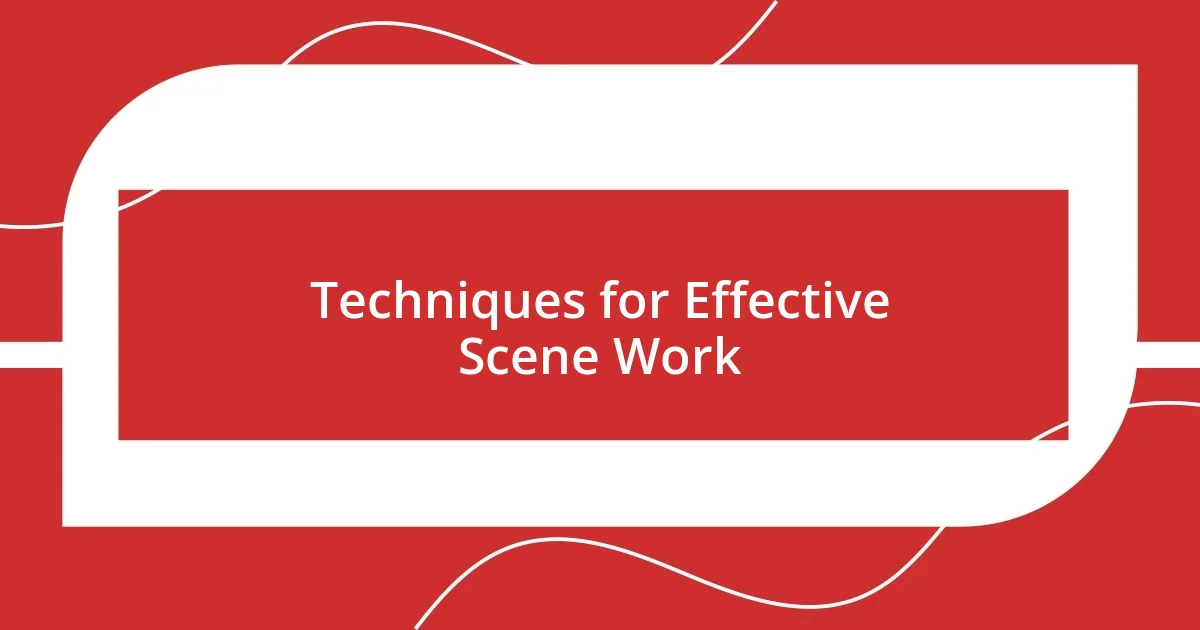
Techniques for Effective Scene Work
When it comes to effective scene work, one technique that stands out is emotional memory. I remember my acting coach asking me to dig into my own experiences to draw out genuine emotions. It was surprising how tapping into my past helped me portray a character’s grief authentically. Have you ever found yourself recalling a specific moment to enhance your performance? That connection can be the heart of a truly compelling scene.
Another technique I’ve found invaluable is analyzing the script deeply. My coach once emphasized that understanding the subtext can unlock layers of meaning. During rehearsals, I learned to ask questions like, “What does my character want in this scene?” and “What’s at stake?” This approach not only enriched my character portrayal but also created richer interactions with my scene partners. I’ve noticed that this analysis often leads to moments of unexpected spontaneity—ramifications that make the scene feel alive.
Finally, physicality plays a pivotal role in scene work. I recall a class where we explored how body language informs character. By experimenting with different ways of moving, I realized how much physical choices can shape emotions and bring a scene to life. Have you ever altered a single gesture, and it changed everything? It’s amazing how the body can express what words sometimes cannot.
| Technique | Description |
|---|---|
| Emotional Memory | Utilizing personal experiences to evoke genuine emotions for character portrayal. |
| Script Analysis | Diving into subtext and understanding character motivations to enhance performance. |
| Physicality | Using body language and movement to inform and deepen character emotions. |
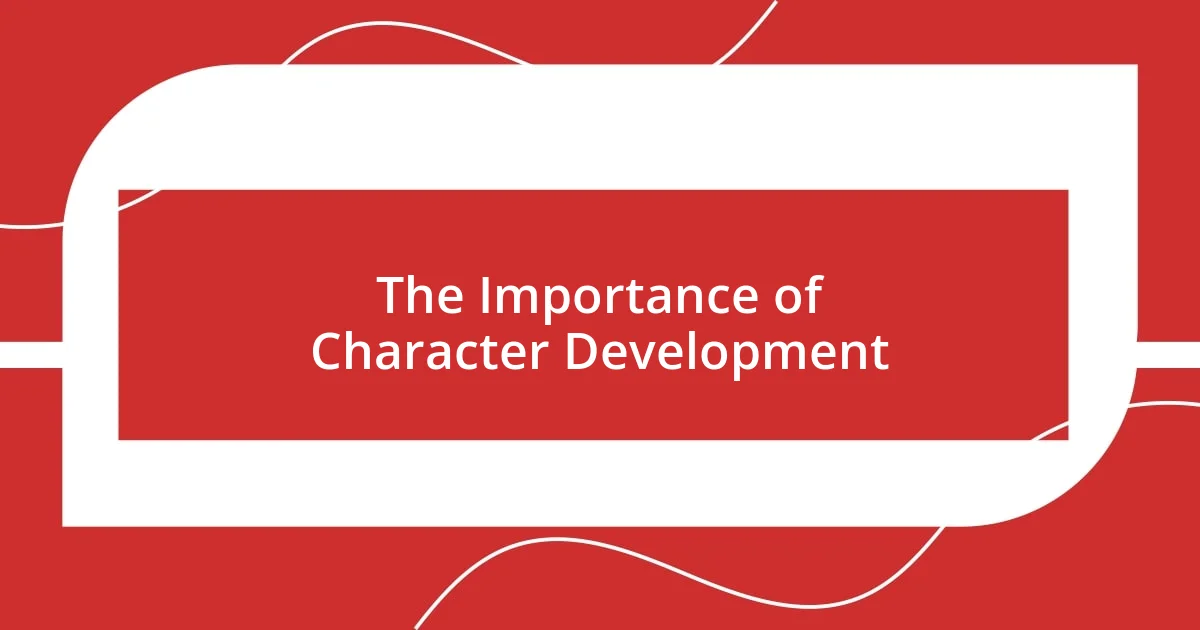
The Importance of Character Development
Character development is like the foundation of a house; it has to be strong and well-formed for everything else to stand. I’ve seen firsthand how diving deeply into a character’s backstory profoundly elevates a performance. For instance, when I played a character grappling with loss, my coach instructed me to explore not just the feelings but also the influences that shaped her. This exploration opened new layers of emotional depth I hadn’t considered, allowing me to connect more authentically with the audience.
- Understanding Motivations: Knowing what drives a character adds layers to performance.
- Exploring Backstory: Delving into a character’s history brings depth to their current struggles.
- Emotional Connection: Relating personal experiences to the character’s journey fosters genuine portrayals.
The beauty of character development lies in the emotional arcs that unfold. I recall a scene in which my character had to confront her fears. As I examined how those fears rooted in past traumas, the realization transformed my performance. It became less about reciting lines and more about living the story. This shift underscores the crucial role character development plays, not just in acting but in human connection itself.
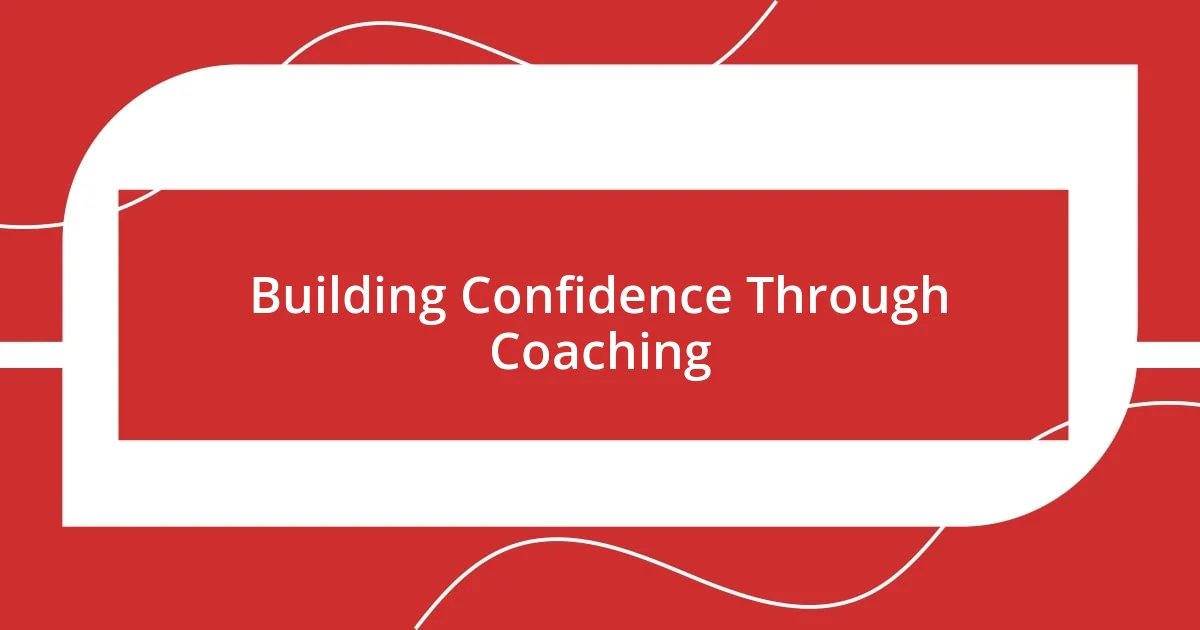
Building Confidence Through Coaching
Building confidence through acting coaching is an experience I didn’t fully appreciate until I was thrown into a challenging role. I remember a particular workshop where the coach pushed us to perform even the most vulnerable scenes in front of each other. At first, it was terrifying—exposing my raw emotions felt like standing naked in front of an audience. But with each rehearsal, I found that embracing those fears not only improved my performance but also made me feel more assured about expressing myself in everyday situations.
In one memorable session, my coach highlighted the importance of positive affirmations. She had us stand in a circle and share things we liked about our performances. I hesitated, but when my turn came, I surprised myself by acknowledging my growth. Hearing my peers express support transformed my self-doubt into a sense of camaraderie and confidence. There’s something uplifting about sharing vulnerabilities with others—have you ever felt that rush of confidence when someone genuinely appreciates your efforts?
As I progressed through my coaching journey, I noticed a shift in how I viewed criticism. Instead of shrinking back at feedback, I learned to see it as a stepping stone to improvement. During one session, my coach pointed out a subtle flaw in my delivery. Initially, I felt defensive, but I realized that identifying areas for growth strengthened my skills. Embracing constructive criticism has not only built my confidence on stage but has also taught me resilience—something I carry with me in all aspects of life.
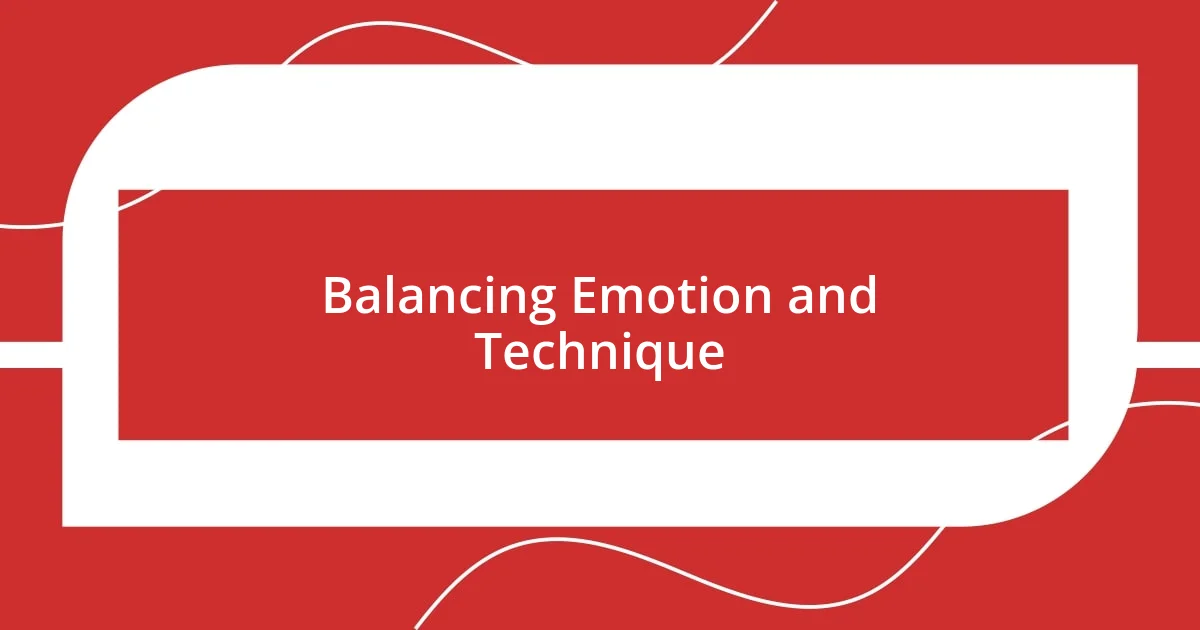
Balancing Emotion and Technique
Balancing emotion and technique can feel like walking a tightrope; too much of either can throw a performance off course. I remember a coaching session where we spent hours honing our vocal delivery. It was technical—focused on breath control and enunciation. However, my coach reminded us that mastery of technique means nothing without genuine emotion to back it up. This simple realization shifted my viewpoint; I learned that the best performances are those where a clear technique supports heartfelt expression.
During a rehearsal for a dramatic scene, I vividly recall feeling the emotional weight of my character. I was deeply invested, yet my coach noticed that it was affecting my delivery. “You’re so caught up in feeling that you’re losing clarity,” she said. I took a step back and realized the importance of grounding my emotions within the framework of my technique. Merging the two allowed me to convey the depths of my character without losing the audience in slurred words or muffled lines. Have you ever found yourself so wrapped up in emotion that the essence of your message got lost? It’s a balancing act well worth mastering.
Ultimately, I’ve come to appreciate that technique isn’t just a skill set; it’s a tool for unlocking emotional authenticity. Learning how to apply specific breathing techniques helped me channel those raw emotions effectively without becoming overwhelmed. When I mastered this balance, I felt a new sense of freedom on stage, where I could explore vulnerability while still delivering a powerful performance. This dance between emotion and technique is not merely about acting; it’s about connecting with the audience in a way that resonates deeply with their own experiences.

Applying Lessons in Real Auditions
I’ve discovered that applying lessons from my acting coaches during actual auditions can be a game changer. One time, I walked into an audition feeling the weight of expectations. Instinctually, I recalled my coach’s advice about taking a deep breath and focusing on the character instead of the pressure. It centered me and allowed my character’s emotions and intentions to flow more freely. Have you ever felt the tension lift just by grounding yourself in the moment?
Another time, during a callback for a significant role, I grappled with my nerves. In return to my coach’s teachings, I visualized my character’s journey, integrating every bit of their pain and joy into my performance. As I stepped on stage, I felt as though I was living the character’s story rather than just reciting lines, which captivated the casting directors. This transformative experience made me realize how vital it is to infuse authenticity into every deliverable—after all, authenticity is what resonates with an audience, isn’t it?
In yet another instance, while preparing for a comedic audition, I relied heavily on the comedic timing techniques my coach emphasized. I practiced in front of friends and tuned into their reactions, making adjustments where necessary. When audition day arrived, I felt confident that I could make the material shine. Seeing the audition panel laugh at all the right moments reinforced my belief in the importance of connecting with the audience, and it reminded me that a genuine connection can leave a lasting impression in any audition. How often do you take a moment to clarify what your audience needs to feel?










